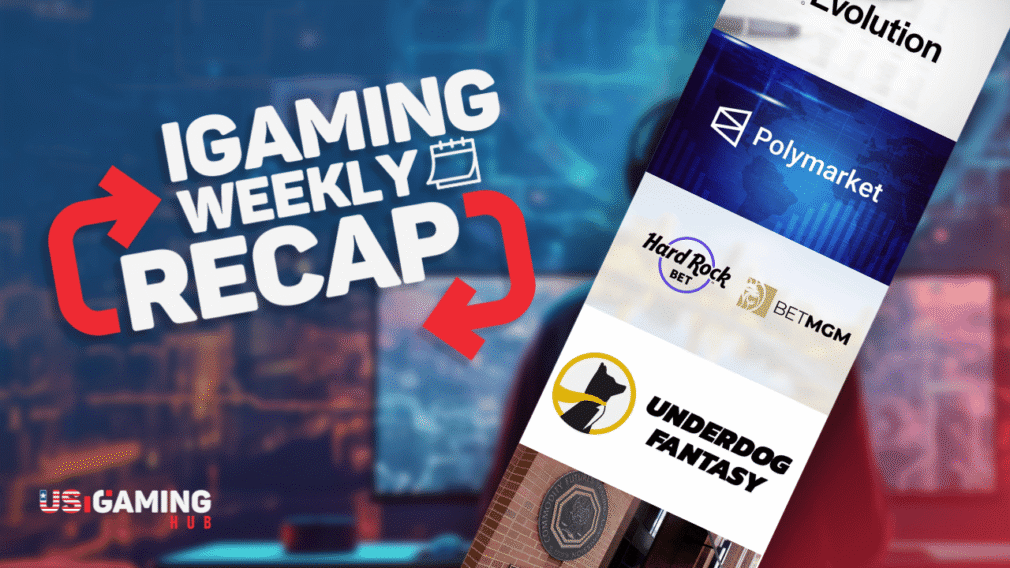iGaming Weekly Recap (July 14–20, 2025): Kalshi Spends Over a Million on Lobbying, While CFTC Staff Faces Cuts
The anti-sweepstakes bill advances in California, prediction markets gain strength with massive lobbying spending, and the CFTC sees significant staff reductions. Missouri prepares to launch its betting market, with Circa emerging as an unexpected contender for an untethered license, while Underdog shifts to a P2P-only model in California. Prediction markets, sweepstakes, sports betting – last week saw plenty of action across these fields.

Underdog Fantasy revamped its daily fantasy sports (DFS) offerings in California, abandoning “pick’em” games where players competed against the house in favor of a peer-to-peer (P2P) model called “Champions.” This shift followed California Attorney General Rob Bonta’s July 3 opinion deeming all paid DFS games illegal sports betting. Bonta classified “pick’em” games as akin to prop bets.
Evolution, a leading provider of live casino and RNG gaming solutions, announced its financial results for Q2 and the first half of 2025. In Q2 2025, the company reported a 3.1% net revenue increase to €524.3 million, compared to €508.4 million in Q2 2024. Despite revenue growth, Evolution faced a 7.7% profit decline to €248.3 million and a slight 0.1% EBITDA drop to €345.3 million, with an EBITDA margin of 65.9%. CEO Martin Carlesund expressed moderate satisfaction with the quarter’s results but emphasized that the company “is not content with the pace of growth” and is actively working to accelerate it.
Missouri is preparing to launch sports betting on December 1, 2025. Three companies: FanDuel, DraftKings, and Circa Sportsbook, are competing for two “untethered” licenses, which offer significant financial benefits by eliminating the need for costly revenue-sharing agreements with casinos or sports teams in Missouri. FanDuel and DraftKings are considered favorites due to their experience, marketing plans, commitment to responsible gambling, and over $40 million invested in the referendum legalizing sports betting. The Missouri Gaming Commission (MGC) is set to decide the winners by August 15.
The Commodity Futures Trading Commission (CFTC) underwent a major reorganization, laying off over 20 employees—roughly 4% of its workforce, affecting divisions like enforcement, market oversight, administration, and data. The layoffs followed earlier voluntary resignation offers and are part of broader changes, including a Supreme Court ruling in McMahon v. New York that strengthens federal authority to reduce agency staffing.
With the departure of several commissioners, including Rostin Behnam, Summer Mersinger, and Christy Goldsmith Romero, and the upcoming exit of Kristin Johnson, the CFTC now has significantly reduced leadership. Under Acting Chair Caroline Pham, the agency is adopting a “light-touch regulatory approach,” which may lessen oversight of platforms like Kalshi, a prediction market relying on self-certification for its sports event contracts.
In California, debate continues over Assembly Bill 831 (AB 831), aimed at banning online promotional sweepstakes casinos. The bill cleared another legislative hurdle, receiving unanimous support from the Senate Public Safety Committee on July 15 and now heads to the Appropriations Committee. Previously, it passed the Assembly in May and the Senate Governmental Organization Committee on July 8. Sponsored by Assemblyman Avelino Valencia, AB 831 seeks to ban platforms using dual-currency systems where players exchange cash for virtual items to win prizes. The bill proposes doubling prison penalties from six months to one year and increasing fines from $1,000 to $25,000 (a 2500% increase) for operators, payment processors, and influencers. The deadline to pass AB 831 is September 12, 2025, or it may be deferred to 2026.
BetMGM and Hard Rock Bet introduced minimum bet requirements for users in Illinois in response to a new state betting tax effective July 1, 2025. The tax charges operators $0.25 per bet for the first 20 million bets annually, then $0.50 per bet thereafter. BetMGM set a $2.50 minimum bet for all bet types (effective July 16, 2025), while Hard Rock Bet implemented a $2.00 minimum, already in effect.
The U.S. Department of Justice (DOJ) and Commodity Futures Trading Commission (CFTC) concluded investigations into Polymarket, a cryptocurrency-based prediction market, without filing charges. Announced on July 15, 2025, Coplan called the decision a “triumph of justice.” This aligns with the Trump administration’s push to ease cryptocurrency regulations, reversing the Biden-era stance. A warming regulatory climate for platforms like Polymarket is evident in the CFTC’s withdrawal of an appeal against a ruling allowing Polymarket’s rival, Kalshi, to offer election betting, and the likely appointment of prediction market advocate Brian Quintenz to lead the CFTC. Polymarket, which recorded $3.6 billion in election bets in 2024 and is backed by Peter Thiel’s funds, is considering raising $200 million and may seek to re-enter the U.S. market legally.
Kalshi, a prediction market platform, spent $1.19 million on federal lobbying in the U.S. to bolster its position. Over $1 million of this was spent in the last five years, with a record $670,000 in 2024. The lobbying aims to secure full Commodity Futures Trading Commission (CFTC) oversight of prediction markets, allowing Kalshi to operate in all 50 states and bypass state gambling regulations.
However, Kalshi faces significant resistance. Its claim that sports contracts serve a commercial purpose conflicts with earlier statements from lobbyists like former Senator Blanche Lincoln, who in 2010 viewed them as “solely for gambling purposes.” Kalshi faces lawsuits in New Jersey, Nevada, and Maryland, as well as opposition from 34 states, over 60 tribal groups, and the American Gaming Association, which argue that Kalshi’s sports markets mimic sports betting.
DraftKings is in talks to acquire Railbird Exchange, a New York-based prediction market platform. Railbird Exchange recently secured a federal license from the Commodity Futures Trading Commission (CFTC), allowing it to operate a legal prediction market in the U.S. The acquisition could expand DraftKings’ reach into futures trading and provide a federal license it previously sought but abandoned.
Recommended









